Books From Seven Provinces
People in Frame of Memories
Mohammadali Fatemi
Translated by Ruhollah Golmoradi
2017-5-30
At the book lunch , the works will be introduced you: "The Red Dress: Memoir of Martyr Ahmad Ommi", "People Don't Die in My Frame: Book of Saeed Janbozorgi", " Windcatchers are waiting: A Collection of Memories of Martyr Ebrahim Bashkardizadeh", "Meeting Wish: Life of Veteran Lady Omolbanin Mansourkhani", "From Fire and Thyme: Martyrs of Raz in Frame of Memories", "06:30 pm: Memories of Brigadier General Pilot Freedman Yusuf (Joseph) Samandarian", "Hidden Love: According to Manuscripts of Freedman Mohammadtaqi Karimi", "The Last Sip: Biography of Martyr Yadollah Nadrlou", book of "Company of Koroğlu: A Narrative of Life of Basiji Hajali Tanha".
Notes Which Were Translated
Book of "The Red Dress: Memoir of Martyr Ahmad Ommi" translated by Mahboobeh Hajiannejad and edited by Mohammadmehdi
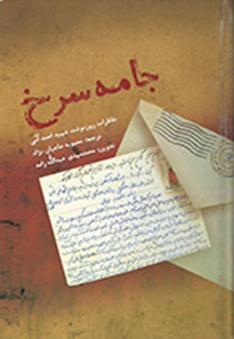
Abdollahzadeh, was released by Office of Stability Culture and Studies of Semnan's Hozeh Honari and Sooreh Mehr Publication in winter of 2017.
There are notes on text book in the introduction of the 589 pages book, like these: Ahmad Ommi, born in 1957 ... had written his memories in English since September 1978 until the day before his martyrdom [in January 1981]... his memories of living in dormitory, family relationships, turbulent days of the revolution year, period of military training and full of ups and downs days of the war ... Ahmad Ommi, in addition to writing his memories every day, also wrote internal and external events titled " marginalia"... his last writing, which a few next hours he would die a martyr, was while he [was] commander a tank.
"The Red Dress" begins with memories of 1978-9 that continues to page 200. Ahmad Ommi wrote on memories of 11 February 1979 (22 Bahman 1357): "the rain which had been started from midnight was interrupted at eight o'clock in the morning, but the sky was still cloudy. People were still struggling armored with enthusiasm. I went out of house of Haj Agha Reza at 9 a.m. All the streets had been blocked with sand bags. More than 20 trucks and 10 tanks had been burnt and three helicopters had crashed too. I walked to Shohada Square. I saw several armed men there who tried to go Ark Square to seize NIRT (National Iranian Radio & Television). I walked along with them and went to Alawi School that Imam [Khomeini] was there. The school was very crowded and noisy. I could not see Imam. That's why I came back to Ark Square. There was a brutal conflict between the army, who supported NIRT, and people …. It was seven o'clock that I was informed that people had seized NIRT..."
Feature of the daily notes is that it is abstract of events of each day in the narrator's mind. Some events are day news and a few days later violation of the news would be seen after changing the events in other notes. The feature also shows that each note is like a document of the same day, and then the narrator didn't manipulate recorded points.
Daily memories of 1358 (1979) is related to only Farvardin (April and June) and memories of 1359 (1981) begins from early Mordad (July and August) and continues until 14 Dey 1359 (January 04, 1981). As the memories go forward, to lose their personal mood and having talk on family members and are more influenced by events and alterations of environment of the narrator. Ahmad Ommi enters military service in August 04, 1980. In memories of the days, subject of military and intelligence training which is presented, caused "The Red Dress" to be included among books that have memories from these days and number of the books among collection of Sacred Defense have been increased continuously.
Period of military training of the narrator coincides with beginning of the imposed war of Saddam's army against Iran and memories of these days include also the news which the narrator reads and hears of this war. After military training in August 04, 1980, he presents himself to 92nd Armored Division of Islamic Republic of Iran's Army in Ahwaz. After going Ahwaz, he writes his memoir in a war area, as commander of a tank M60. Bunkers in which he spends days and nights and lines of war that he come and go there, are all diaries of the narrator. He writes in note January 02, 1981: "I slept after midnight. After writing a letter for my sister, Khadijeh, and also a postal card for my brother in Garmsar Station, suddenly I burst into tears because it brought to my mind in a moment that I would die a martyr in fighting with Iraqis! I do not know when I slept…"
In "The Red Dress" and after daily notes of Ahmad Ommi, it also includes two other parts; appendixes (including letters and interviews) and images. Letters are last letters of the narrator for his family that are about mood of the sacred defense fronts in the first months of invasion of Saddam's army. Interviews also include interviews that Ahmad Ommi did with some of his comrade Non-commissioned officers at the end of tank training course and they had told of their mood in those days.
Photographer of the War and an Old Guerrilla
"People Don't Die In My Frame: Book of Saeed Janbozorgi" is name
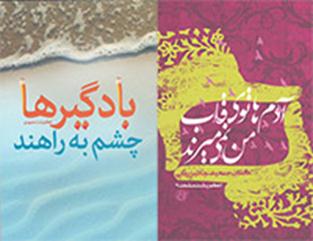
of fifteenth book of series of "From Eyes". The book is written by Azam Posht Mashhadi and Revayat'e Fath Publication published it in 175 pages in 2016.
"People Don't Die in My Frame" has 24 narrators and names of the collaborators of the work are also referred: researcher: Sedigheh Soltanshahi, Consultant of compilation: Mohammad Ghasemipour, editor: Fatemeh Doostkami.
Narrators have told about Saeed Janbozorgi (1965 - 2002) that "he loved photography and took photos in fronts of [the sacred defense]," "he established Association of Sacred Defense Photographers", "his love to photography began in the war and completed in Hajj"," no one knew he is a disabled veteran. He didn't say anything himself about it too", " he had painted many caricatures from Saddam Hossein and had hold festival several times in [garrison] Dukuhe for the [fighters] guys ", " he could make universal and timeless words with his pictures"," in Operation Dawn-10 ... all of the area had been polluted with chemical bomb and he had taken his mask for taking photo. He was polluted with chemical bomb there more than Halabja", etc.
These were statements of the book narrators. According to their different places in life of Saeed Janbozorgi (family, friend, comrade, artist, etc.) they have told their memories about him.
Other book of Azam Posht Mashhadi which was published in 2016 is called "Windcatchers Are Waiting: A collection of Memoirs of Martyr Ebrahim Bashkardizadeh". The 128-page book was published by Hormozgan's Hozeh Honari in Aminan Publication supported by Hormozgan Electricity Distribution Co.
"Windcatchers Are Waiting" has eight chapters and it is result of recording and collecting oral memories about martyr Ebrahim Bashkardizadeh (1944 - 1986). He, was known as old guerrilla, was killed in complementary stages of Operation Karbala-5.
Each chapter has a short memory that each of them has its own narrator. They are family, friends and colleagues of martyr Bashkardizadeh. By reading the memories, we find out that when the producers of film "Captain Khorshid" by Nasser Taghvai had gone to Bandar Lengeh, Ebrahim Bashkardizadeh was responsible for electrification for filming group of the film.
As well as, we read that "usually old people were used in logistics. In division they took Ebrahim in logistics group, but he refused and said: "I came to fight not feeding and washing pots!' before that he had worked in logistics, but the time he had come to fight. They insisted him, but Ebrahim refused and as assistant of RPG shooter joined one brigades of company Alhojjat ..."
This journey was the last journey of Ebrahim Bashkardizadeh and he died a martyr in Mahi canal in operational area of Karbala-5, but his body was not found and announced as missing. Disquisition group found bodies of some of the martyrs of Operatio Karbala-5 in 1995 that Bashkardizadeh's body was among them.
A Veteran Lady and Martyrs of Raz City
"Meeting Wish: Life of Veteran Lady Omolbanin Mansourkhani" is title of a book interviewed and compiled by Atefeh Talebpoor
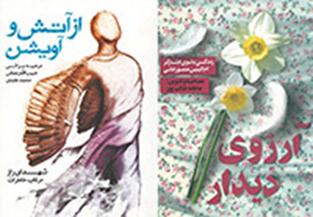
. This book which is provided in Unit of stability Studies and Culture of North Khorasan's Hozeh Honari was released to market of the book by Sooreh Mehr Publication in winter of 2017.
This 248-page book is result of more than 20 hours interview with its narrator. She was born in 1944 and it is natural that begins recounting her memories from the same far years. As the memories become close to 1979, they would be more historical and political, because the narrator is engaged in activities of the struggle against the Pahlavi regime too.
Mansurkhani in the same years of exile of Imam Khomeini in Najaf, succeeded to see Imam in traveling to shrines in the holy shrine of Imam Ali (as). She even quotes a memory of June 1963: "In those days I was in Iranshahr," but on the eve of Islamic Revolution she is in Bojnoord and narrates events about the city. In pages 145 and 146 of the book Islamic Revolution happens and from here events of after the victory of Revolution are narrated.
Background of the narrator in social and political activities causes to be of those who involved in the referendum of Islamic Republic of Iran in his city, becomes a member of the Islamic Republic Party, to work in Committee of Health and Treatment of Jihad of Construction, to engage in Logistics of Sacred Defense fronts and be present in many scenes of defense of the revolution.
In 1983 while she returned health center of Bojnoord and was in charge of maternal and child department she dispatched Ahwaz as head of group of women rescuers. Coinciding the days with liberation of Khorramshahr triggered important memories for the narrator which they are recounted in "Meeting Wish". In the final pages of the book, the narrator says memories of the days when his son was killed in the war fronts.
"Meeting Wish" is 45th work of writing works collection of North Khorasan's Hozeh Honari and 18th book in the series with subject of stability literature.
Another book which was published as 42nd work of writing works collection of North Khorasan's Hozeh Honari and 17th book in the series with subject of stability literature is called "From Fire and Thyme: Martyrs of Raz in Frame of Memories". Marzieh Barati, Habibollah Rahmani and Mohammad Abedi wrote the book and the Office of Sustainability Studies and Literature North Khorasan's Hozeh Honari and Sooreh Mehr Publication published it in 2016.
218-page book of "From Fire and Thyme" addresses 10 martyrs of Raz and Jargalan city in North Khorasan. The city has 33 martyrs of Sacred Defense. Martyrs who are introduced in this book: Jahanbakhsh Qodosian (1961 - 1982), Mohmmadali Chahi (1949 - 1982), Abdollah Bazergar (1960 - 1986), Parviz Mohammadi (1962 - 1983), Esmail Einbeigi (1965 - 1983), Mohammadtaqi Shafiee (1968 - 1986), Majid Amani (1972 - 1988), Firuz Asadi (1971 - 1987), Shah Mohammad Rezazadeh (1967 - 1987) and Gholamreza Aghighi (1967 - 1987). In each martyr's part, there are memories of those who lived with him and were his comrades. Through the memories story of each martyr is narrated and he is introduced. At the end of the memories there are two appendixes of martyrs testaments and images.
Memories of Freedman Pilot
"06:30 pm: Memories of Brigadier General Pilot Freedman Yusuf (Joseph) Samandarian" is name of a book which is
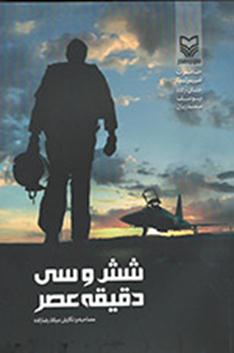
interviewed and wrote by Milad Rezazadeh in Office of Stability Culture and studies of East Azerbaijan's Hozeh Honari and released in book market by Sooreh Mehr Publication in 2016.
This 256-page book, addition to Preface and Introduction, has seven chapters and two parts entitled "Another Narrative" and "Photos and Acknowledgements".
The narrator of book memories was born in Tabriz P January 31, 1955, from September 1973, who was hired in Air Force, until August 14, 1986, who did his last flight, had 983 sorties. Editor of the book explains that he wrote memories of this pilot based on 20 hours interviews with him.
Titles of the book chapters are a sign of their content: Childhood so Youth, Entering Air Force, Complementary Trainings in Fourth Prey Base, End of Courses and Service in Prey Battalion, Beginning of Imposed War by the Baath regime of Iraq, Traveling to Germany For Treatment His Wife .
Feature of "6:30 p.m." is a detailed narrative of the days that the narrator was being busy with pilot training in abroad. Many photos of these days within the book and on the sidelines of pages of the same narrative, and completed the details more. As the narrator expressed information about education and the text exceeded just memories, so it will absorb pilot fans or pilot likes him toward the text.
In page 115 the book reaches at on the brink of imposed war of Saddam's army against the Islamic Republic of Iran. The narrator says about operations that were done in response to attacks of the enemy until his last flight in 1986. From page 167, another chapter of his memories to be opened, memories of captivity by Saddam's Army. At the end of the memories, period of post-release of captivity of pilot Yusuf Samandarian is addressed too, that what he did and how spent time. End of the text is titled "another version of the last flight of Brig. Gen. Yusuf Samandarian narrated by Abbas Ramezani" is named. Fighter of the narrator was also targeted at the same last flight of the main narrator of the book, but he survived and wasn't captured.
In addition to images within the text and related to the memories, the book "6:30 p.m." ends with an album of photos of pilot Yusuf Samandarian.
Those Thirteen Bijari Students
"Hidden Love: According to Manuscripts of Freedman Mohammadtaqi Karimi" is a collection of memories
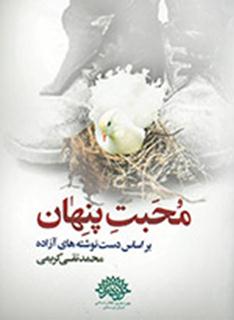
of Sacred Defense. This 246-page book was released winter of 2017 by Kurdistan's Hozeh Honari and Parhib Publication.
We know in the introduction that during the war, despite opposition of current officials, a thirteen group of students of Bijar's high schools were dispatched to southern fronts. Six of this group were died a martyr in Operation Before the Dawn in February 1982 and seven were captured by the enemy. Mohammadtaqi Karimi is one of those students who now wrote and published memories of Sacred Defense.
He introduces his twelve comrades in travel to the war fronts until page 54; Martyrs Kamal Habibi, Hossein Khosravian, Mohsen Alvandi Mehrdad Sardarzadeh, Mohammad Jafari Khodlan, Jafar Rezaie and freedmen Seyyed Mahmoud Bayat Ghiyasi, Mohammadbaqer Sarabi, Abolghasem Takhti, Abolghasem Nasrollah Zanjani, Nemat Hajali and disabled veteran Reza Shokrgozar. After page 54, he addresses Operation Before the Dawn. His capture memories also begin from page 61 and continue until end of the book and moments of releasing the narrator.
From Zanjan to Majnoon Island
"The Last Sip: Story Biography of Martyr Yadollah Nadrlou " (1956 - 1983) is the title of a book by Masoud Babazadeh. This 294 page book
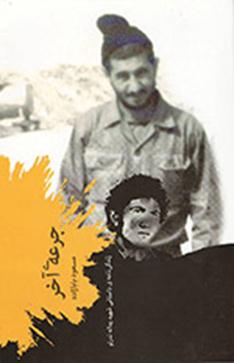
was published by Harir Publication in 2016. In the first pages of the book, it is mentioned Zanjan's Office of Preserving Relics and Publishing Values of Sacred Defense and Zanjan's municipality as organizations that collaborated in publishing this work.
What is notable in story narrative of martyr Yadollah Nadrlou in book of "The Last Sip" is social prestige of the martyr. From this view, his chivalry spirit to be highlighted, and when the memories approaches victory of the Islamic Revolution and then Sacred Defense, we read that the same spirit causes his presence in the scenes of supporting the Islamic Revolution in Zanjan and the war fronts with Saddam's Army: "You, fighters, caused that I find the right way. After God, they were you who provided military training and the front for me ... You caused that the division commander made a speech in the morning and to call my incapacitate and inferior name... "
Eleven chapters Book of "The Last Sip" is ended with narrating moments of Yadollah Nadrlou martyrdom in Majnoon Island. Since the book text enters into story of the martyr in the years after the Islamic Revolution, takes more documentary aspects.
Joke and Humor Company
"Company of Koroğlu: A Narrative of Life of Basiji Hajali Tanha" by Mehdi Timar was published by Department of Preserving Relics and Publishing Values of Sacred Defense of Qom and Darolnashre Eslam Publication.
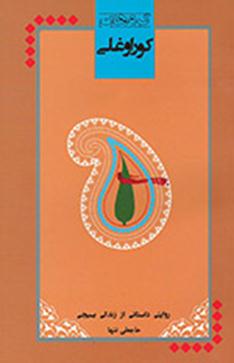
In the 190-page book, after reviewing story of the narrator in the period before and after the Islamic Revolution, his memories of Sacred Defense are presented in 21 pieces. 17th Ali ibn Abi Talib Division (AS) and operations such as Muharram, Dawn-4 and 8, Karbala-1 and 5 are mentioned in the memories and we read as quoted by the narrator: "I was in charge of Meysam Company from Imam Sadiq (AS) Battalion that we later changed name of the company to Ammar. But our company had a nickname called Koroğlu and the battalion forces knew our company by this name. That's why we did not have a certain order and there were much joking and laughing among our people, but during work and task, our company was serious and was hard work and active.
In the last pages of memories, Hajali Tanha addresses a little about his story in years after the war. " Company of Koroğlu" is ended with testamentary texts of martyrs Hassan Dehghani (1963 - 1986), Reza Pashakhanlou (1964 - 1987), Seyyed Morteza Razavi (1967 - 1986), Seyyed Ali Tabatabai (1966 - 1986), Bahram Gharehsheikhlou (1962 - 1986 ), Vahid Vakili (1965 - 1986), Gholam Hossein Ahmadi, Mohammad Ziaee (1966 - 1985), Abolghasem Daliri (1925- 1982), Hossain Kashi (1964 - 1981) Ahmad Amirian (1964 - 1981) and photos related to the memories of the narrator.
Number of Visits: 4617








The latest
Most visited
The Arab People Committee
Another event that happened in Khuzestan Province and I followed up was the Arab People Committee. One day, we were informed that the Arabs had set up a committee special for themselves. At that time, I had less information about the Arab People , but knew well that dividing the people into Arab and non-Arab was a harmful measure.Kak-e Khak
The book “Kak-e Khak” is the narration of Mohammad Reza Ahmadi (Haj Habib), a commander in Kurdistan fronts. It has been published by Sarv-e Sorkh Publications in 500 copies in spring of 1400 (2022) and in 574 pages. Fatemeh Ghanbari has edited the book and the interview was conducted with the cooperation of Hossein Zahmatkesh.Is oral history the words of people who have not been seen?
Some are of the view that oral history is useful because it is the words of people who have not been seen. It is meant by people who have not been seen, those who have not had any title or position. If we look at oral history from this point of view, it will be objected why the oral memories of famous people such as revolutionary leaders or war commanders are compiled.Daily Notes of a Mother
Memories of Ashraf-al Sadat SistaniThey bring Javad's body in front of the house. His mother comes forward and says to lay him down and recite Ziarat Warith. His uncle recites Ziarat and then tells take him to the mosque which is in the middle of the street and pray the funeral prayer (Ṣalāt al-Janāzah) so that those who do not know what the funeral prayer is to learn it.


